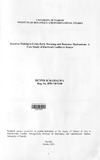| dc.contributor.author | Wamalwa, Dennis B | |
| dc.date.accessioned | 2012-11-13T12:32:47Z | |
| dc.date.available | 2012-11-13T12:32:47Z | |
| dc.date.issued | 2011 | |
| dc.identifier.uri | http://erepository.uonbi.ac.ke:8080/handle/123456789/4506 | |
| dc.description.abstract | This study examines the decision making in crisis early warning and response mechanisms with a focus on the electoral conflict in Kenya. The work starts from the premise that the electoral violence was largely due to lack of a good decision making process and appropriate response. The decision making was done in an ad-hoc manner due to the absence of a robust and systematic crisis decision making and early-warning system.
The study begins with an appreciation of crisis as a concept and critically examines the decision making process in crisis early warning and response mechanisms. The interaction between warning and response and the underlying challenges are explored. These are followed by an interrogation of the literature that gives deep insights in crisis decision making and response mechanisms. This links previous research and provides the basis for the conduct of the study.
The research findings are interpreted in the prism of the cybernetic model of decision making that sees the government as a communication system equipped for feedback processes that enable it to evaluate its past actions and their impact on its environment, and to alter its present and future actions so as to attain set objectives. The study is qualitative with both primary and secondary data examined. Primary data entails data collected first hand involving responses to key informant interviews and contents of focused group discussion involving senior Government security analysts involved in crisis early warning.
The study concludes that there appears to have been confusion in the KSIM particularly at the top decision making organs, the CSC and NSAC. They were characterised by partisan interests and all sorts of symptoms of defective decision making with no concrete contingency plans put in place to address the escalating crisis. | en_US |
| dc.language.iso | en_US | en_US |
| dc.publisher | University of Nairobi, Kenya | en_US |
| dc.title | Decision making in crisis early warning and response mechanisms: a case study of Electoral conflict in Kenya | en_US |
| dc.title.alternative | Thesis (MA) | en_US |
| dc.type | Thesis | en_US |

